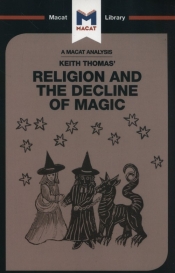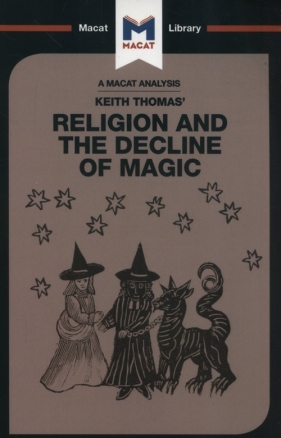34.59
Literatura obcojęzyczna
Macat International
Religion and the Decline of Magic
Opis
Keith Thomas's classic study of all forms of popular belief has been influential for so long now that it is difficult to remember how revolutionary it seemed when it first appeared.
By publishing Religion and the Decline of Magic, Thomas became the first serious scholar to attempt to synthesize the full range of popular thought about the occult and the supernatural, studying its influence across Europe over several centuries. At root, his book can be seen as a superb exercise in problem-solving: one that actually established „magic” as a historical problem worthy of investigation.
Thomas asked productive questions, not least challenging the prevailing assumption that folk belief was unworthy of serious scholarly attention, and his work usefully reframed the existing debate in much broader terms, allowing for more extensive exploration of correlations, not only between different sorts of popular belief, but also between popular belief and state religion. It was this that allowed Thomas to reach his famous conclusion that the advent of Protestantism – which drove out much of the "superstition" that characterised the Catholicism of the period – created a vacuum filled by other forms of belief; for example, Catholic priests had once blessed their crops, but Protestants refused to do so. That left farmers looking for other ways of ensuring a good harvest. It was this, Thomas argues, that explains the survival of what we now think of as „magic” at a time such beliefs might have been expected to decline – at least until science arose to offer alternative paradigms.
By publishing Religion and the Decline of Magic, Thomas became the first serious scholar to attempt to synthesize the full range of popular thought about the occult and the supernatural, studying its influence across Europe over several centuries. At root, his book can be seen as a superb exercise in problem-solving: one that actually established „magic” as a historical problem worthy of investigation.
Thomas asked productive questions, not least challenging the prevailing assumption that folk belief was unworthy of serious scholarly attention, and his work usefully reframed the existing debate in much broader terms, allowing for more extensive exploration of correlations, not only between different sorts of popular belief, but also between popular belief and state religion. It was this that allowed Thomas to reach his famous conclusion that the advent of Protestantism – which drove out much of the "superstition" that characterised the Catholicism of the period – created a vacuum filled by other forms of belief; for example, Catholic priests had once blessed their crops, but Protestants refused to do so. That left farmers looking for other ways of ensuring a good harvest. It was this, Thomas argues, that explains the survival of what we now think of as „magic” at a time such beliefs might have been expected to decline – at least until science arose to offer alternative paradigms.
Szczegóły
Tytuł
Religion and the Decline of Magic
Autor
Simon Young
, Helen Killick
Wydawnictwo
Seria
Rok wydania
2019
Oprawa
Miękka
Ilość stron
100
Format
13.0x20.0cm
Języki
angielski
ISBN
9781912127153
Rodzaj
Książka
Stan
Nowy
EAN
9781912127153
Dodałeś produkt do koszyka

Religion and the Decline of Magic
34,59 zł

Recenzje